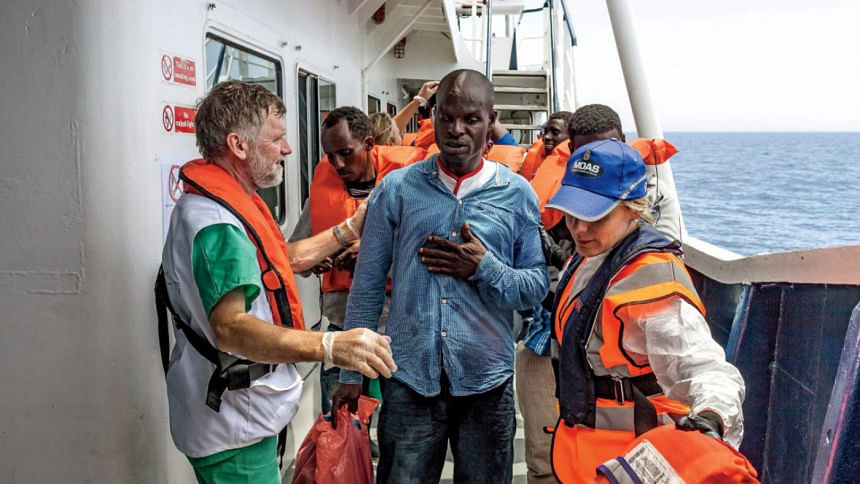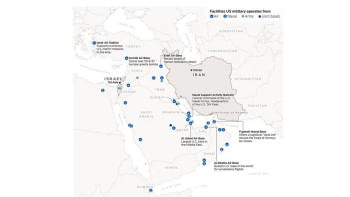Entrepreneur turned saviour

Back in April, 2015, the world watched in horror as news flashed around the globe of a ship capsizing in the Mediterranean and hundreds of migrants perishing in the aftermath. Often cited as one of the worst migrant disasters, it was also the time that unleashed a very lucrative trade for people smugglers, who made windfalls in profit by ferrying thousands from politically unstable regions in the Middle East and Africa to Europe.
While the sharp rise in deaths due to accidents in sea triggered a row in the EU on whether to allow these migrants to set foot on its soil, the efforts of two individuals showed us that it is possible to save human lives without changing national or even common market policy towards refugees. The April tragedy brought together an American named Christopher Catrambone and Italian Regina Catrambone, both successful entrepreneurs in insurance and risk management, to do something about providing safe passage, providing medical care and ultimately assist in the asylum process of the hapless migrants.
Mr. Catrambone is a 31-year old, owner of a successful multimillion-dollar company, who decided to go on a holiday with spouse Regina and daughter on their 24-metre yacht for a three-week cruise that took them off Malta and very close to the shores of North Africa. Incidentally, the yacht came across a sunken migrant boat with no survivors and something changed for all of them. Enter the Migrant Offshore Aid Station (MOAS), which describes itself on its website as "the first privately-funded mission to assist migrants at sea. Its primary aim is to reduce loss of life during dangerous migrant crossings". The company specialises in "search and rescue" operations. The Tangiers Group owned by him is in the business of providing medical, insurance and risk management to a global client base. Subsidiary companies employ some 100 employees who manage some 20,000 medical and service providers, and interestingly, the group's operations base is in Malta.
Given that the expertise to mitigate risk already existed in the companies founded and headed by Christopher, and that his team in effect saved lives in conflict zones, perhaps the urge to reach out and save the lives of the distressed, who had abandoned everything in their homeland in the faint hope of reaching a haven on the distant shores of Europe, appealed to the man. The word desperate is what best describes people who choose to brave choppy waters of the high seas on rickety boats that were never designed for ocean travel. It is hardly a wonder that thousands died during those fateful months.
MOAS' journey has not been without hiccups. Traditional donors and international NGOs were less than sceptical about his ideas. As pointed out in an article in The Guardian in July 2015: "Setting up Moas was not cheap, with monthly operating costs of up to €600,000. Two rigid-hulled inflatable speedboats with twin 70-horsepower engines were bought to ferry migrants to the Phoenix. Catrambone hired an experienced search and rescue crew as well as leasing two helicopter drones and their operators from the Austrian company Schiebel. He was determined to get out to sea, however, and Regina agreed that they could cover the 10-week operation in 2014 with a further $2.3m of their own money."
The couple took their fleet to the Mediterranean, off the Libyan coast, in August 2014. Over the next 10 weeks, the "Phoenix" and its crew is credited with saving 1,462 people and assisted a further 1,500 to reach Italian navy vessels stationed in the area. Those numbers take on new meaning in the backdrop of the fact that during the period of March to October, it is estimated that some 100,000 people were squeezed into overcrowded vessels, many of which routinely sank from Libyan shores and the death toll was estimated at more than 3,400.
This was a family affair. Christopher assisted speedboat crews in missions. His wife and daughter, on the other hand, helped in the care of migrants once they reached the shore. And these people needed help; from Rasha, an 18-year old soft spoken English-speaking Syrian native, who saw both her parents being killed when her boat went down, to Hakim Bello who was fleeing war-ravaged Syria. They all needed help – medical, papers, asylum-seeking advice, the works. To what end they were successful in getting these people refuge in Europe is not known. What is known is that that Christopher Catrambone decided to make a difference, which he did along with his family. MOAS's philosophy is best described by its founder: "Wealth can be very short-term. We are not trying to be crusaders. We're just being humans, keeping hold of our dignity". He and Regina Catrambone have been recognised for their efforts "for offering a lifeboat when the EU wouldn't" and is a recipient of the prestigious "100 Leading Global Thinkers" by Foreign Policy in the Challenger-category.
The writer is Assistant Editor, The Daily Star.

 For all latest news, follow The Daily Star's Google News channel.
For all latest news, follow The Daily Star's Google News channel. 



Comments